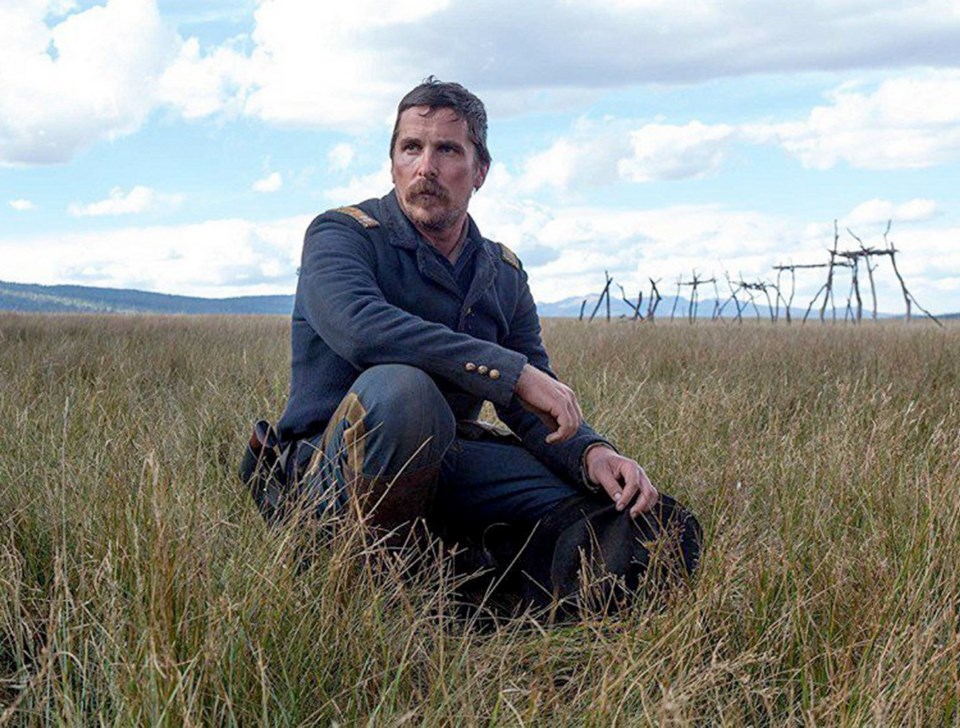The frontier drama Hostiles stars Christian Bale as cavalry Capt. Joseph Blocker, a renowned Native-American hater nearing retirement in 1892. His last assignment is to unwillingly escort a recently released Cheyenne war chief and his family on a dangerous trek from New Mexico back to his Montana homeland.
The film combines army-and-Indian lore, atmospheric authenticity, violent conflict and a passionate appreciation of the Rocky Mountains. In those features, it’s a western like many others.
But it’s what’s different that drew Bale to the project. It is based on fact. The tribe had been deceitfully transported by the government from their ancestral area to the barren and bleak desert southwest. As Bale noted in a recent phone conversation, Hostiles aims to go deeper than sheer clichés to address the plight of Native Americans who were treated like aliens in their own country.
“I’m always in the market for something that would obsess me,” he said. “This is not a black-hat, white-hat western. It’s not your mom and pop’s western. It’s not a propaganda western of good cowboy, bad Indian. What was fascinating to me was it’s not for the faint of heart, but neither is America’s history. It’s harsh and it addresses who we are in a very visceral way.”
Bale plays a man who intimately knows the scars of battle. After decades in the military, “he understands fully the pain of seeing brothers in arms killed, and he feels the hatred stemming from that.”
While Cheyenne Chief Yellow Hawk (played by Wes Studi) had led some of the battles that killed his soldiers, Blocker respects him. He knows that he would have acted the same way “if his culture and way of life was under attack” as Natives were under the doctrine of Manifest Destiny. As the U.S. began to emerge as a global power in the late 19th century, the theory argued that its white Protestant citizens were entitled by God to occupy whatever land they pleased in North America, Central America or overseas, despite whoever owned it.
With Yellow Hawk as the defender and Blocker as the attacker, “he’s fully aware that Manifest Destiny, practically, is grabbing land and genocide,” Bale said.
When the political winds change, the government releases the ailing chief as a public relations stunt, a move Blocker considers a loathsome act by civilian politicians who are making his friends’ deaths meaningless. On their 1,600-kilometre journey, the two men grapple with how to move beyond hatred and guilt. Though he says “there is no other way,” Blocker knows there is, but a soldier must follow his orders.
“That to me is a fascinating story,” Bale said, made all the more meaningful by Blocker’s stoic behaviour. “The leader cannot show vulnerability, but you get a circle of characters around him who do so,” reflecting what’s happening in his gut.
The filming was unusual in that it was done almost entirely on location and chronologically, beginning in the arid landscapes of New Mexico and gradually proceeding north and up in altitude to the greenery and trees of Colorado. “How ruggedly beautiful it is, but how horrific it is at the same time,” Bale said.
Part of his preparation for the role was to learn the vanishing Cheyenne language. “Sadly, the speakers number in the hundreds.” He was taught by Northern Cheyenne Chief Philip Whiteman Jr. Hiring him was a wonderful decision, Bale said.
“He came down to advise me, and he would not teach me the language until I learned the culture. We did many hours talking with one another until he said: ‘All right, you’re ready.’ It’s a beautiful, poetic language.” Cheyenne is spoken at length in several subtitled scenes. Bale, who was born in Wales but now lives in the United States, said: “I certainly enjoy American history because since the Revolutionary War, the timeline is much shorter than English history, so it’s easy to get a grasp on.” That knowledge felt insightful to Bale as he watched U.S. President Donald Trump host an event honouring Native American veterans whose military communications in Najavo, untranslatable to Axis codebreakers, helped to win the Second World War.
“He had Andrew Jackson’s portrait right behind,” giving prominence to an infamous proponent of Indian removal, “and he chooses to call [Democratic senator] Elizabeth Warren ‘Pocahontas’ at the same time.” That had a special resonance for Bale. In Terrence Malick’s 2005 film The New World, he played an English aristocrat who comes to love the chief’s daughter (Q’orianka Kilcher, who also is in Hostiles).
“Clearly this is not somebody who has spent time studying Native American culture,” Bale said of Trump. “That’s just one individual. A highly important one, but one individual. More important is the relevance that we saw happening while making the film and after making the film — the comfort with which so many Americans started to express hatred toward people different from themselves. And that became so quickly acceptable.
“We’ve been here before. That never works. And as somebody who is English but has chosen to come to America, I can tell you the rest of the world looks at America and knows that [it] is so special and such a wonderful country precisely because of that inclusion. And to deny that is not to recognize what makes America so unique. That is also a tragedy. Hopefully a short-lived tragedy, but to keep repeating the same mistakes is insanity. We should have learned from this, and the majority have. But it was clear that this film was becoming more and more relevant.”



